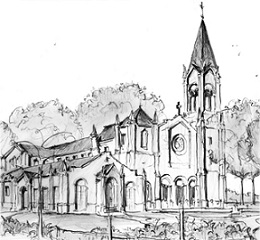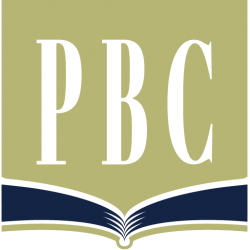 As we prepare to celebrate Reformation Sunday, I’ve asked my wife, Jennifer, to share her testimony of coming to faith in Christ and leaving Roman Catholicism.
As we prepare to celebrate Reformation Sunday, I’ve asked my wife, Jennifer, to share her testimony of coming to faith in Christ and leaving Roman Catholicism.
Her personal story puts a human face on the need to evangelize Roman Catholic friends and family while there’s still time. Here’s what she wrote:
“I come from a long line of Catholics. Catholicism was part of my heritage, my upbringing, it was part of the very fiber of who I was.
Of course I went to Catholic school. I was baptized as an infant, made my First Holy Communion and was confirmed in the Catholic Church.
I remember when I participated in the World Youth Day when Pope John Paul II came to America. I wanted to buy a bumper sticker that read “100% Catholic.”
I was just that. I believed it all–that you had to be a good person to go to heaven; that nobody can know for sure that they are going there; that baptism and attending Mass and all the other sacraments and participation in Holy Days of Obligation were vital to obtaining God’s favor.Â
I was a good Catholic, and proud of it. I never committed any “mortal” sins, just the “venial” sins like lying. I thought I was pretty good. By appearances I was. I was moral, and like most Catholics, I was lost.
Meanwhile one of my friends who called herself “just a Christian” would quote the Bible to me. She told me there was no such place as purgatory, that Mary wasn’t immaculate, and most importantly, that people are only saved by grace through faith in Christ and not as a result of our good works [or attending Mass] (Ephesians 2:8-9).Â
That’s the true gospel. We are all sinners. Sin is an attack on a holy God. He requires that sin must be punished. Romans 3:23 teaches: “All have sinned and fall short of the glory of God.†And Romans 6:23 says that the “wages of sin is death.â€
Jesus Christ came to pay for the sins of all who would believe. Period. We must trust in Jesus alone for salvation. No works can save us; no sacraments; no moralism. Only trust in Jesus, the promised Messiah. That’s the gospel.Â
I thought that sounded too good to be true and I rejected it. I thought my friend needed that more than I did because I was so prideful… and in my mind, I lived a better life than she did. Â
I eventually understood that a true follower of Christ, true Christianity, is not predicated upon living a clean and moral life or being the best person we know how to be. Nor is it about being baptized for our salvation.
No one is good enough to earn salvation. Baptism doesn’t save. A true Christian believes in Jesus Christ’s finished work on the cross as the full and final payment for our sin. It’s Christ plus nothing.
“And you, who were dead in your trespasses and the uncircumcision of your flesh, God made alive together with him, having forgiven us all our trespasses by canceling the record of debt that stood against us with its legal demands. This he set aside, nailing it to the cross. He disarmed the rulers and authorities and put them to open shame, by triumphing over them in him†(Colossians 2:13-14).
I told my parents and extended family that I’d become a true Christian and was no longer a Catholic—on Easter Sunday no less. I was 17.
My parents required me to continue going to Mass though while I lived under their roof. They called it “getting your ‘meat and potatoes.’â€
So I would attend the early service at a Christian church then zip over to the Catholic Church. And what Jesus said about serving two masters was certainly true in my case: I loved one and hated the other. Â
One Sunday, the priest was encouraging everyone to go to confession. He said, “Go to confession. Just don’t go to hell.” At that, I walked out of church, never to return.
My parents asked me to meet with a priest and talk about my new beliefs. I agreed to meet with the priest. I knew the Truth and that that Truth was not in the Roman Catholic Church.
Bible in hand, I met with Father Michael. He was annoyed that I brought my Bible, and said as much. He explained that only the Catholic clergy could interpret the Bible properly.
He ended our conversation by encouraging me to “go by what’s in here†(pointing to my heart), and not by “what’s in here†(pointing to my Bible).
That sums up Catholicism. It’s what fallen people want it to be, not what God has designated His church to be in His Word. The priest was so wrong. Catholicism is so wrong.
“As we have said before, so now I say again: If anyone is preaching to you a gospel contrary to the one you received [the gospel of grace alone], let him be accursed†(Galatians 1:9 ESV).
Catholics regularly pray for the dead and to the dead for that matter. They worship Mary. They believe the Pope has the same authority as the Bible. Catholics can never know if they are saved because the answer is based on them and how good they are, not on the finished work of Christ.
A lot of evangelical leaders and even friends in mainstream Christianity are now embracing Catholics as Christians. No need to evangelize them. “They are on the same team,†they say.
That is false. They are a different team with a different Jesus, a different source of authority, and a different gospel. If we tell ourselves that Catholics are Christians, then no one will preach the true gospel to them.
“And how are they to hear without someone preaching? And how are they to preach unless they are sent? As it is written, ‘How beautiful are the feet of those who preach the good news!’ But they have not all obeyed the gospel. For Isaiah says,  ‘Lord, who has believed what he has heard from us?’ So faith comes from hearing, and hearing through the word of Christ†(Romans 10:14-17).
Yes, some Catholics are moral and socially-minded people. They pray and believe in God. So how do we know if a Catholic is saved? Easy. There’s a simple test. Just use the gospel.
What are they trusting in for their salvation? Are they trusting in the finished work of Christ on the cross for their sin—alone? Or are they trusting in Christ and their good deeds and the revelations from the Pope, and their prayers to Mary and the sacraments and so forth?
Only Christ alone can save someone. If we put our hope in anything else along with Him, then our trust is not in Him.
Pray for Catholics. Evangelize Catholics. Proclaim the true gospel of Christ alone. Christ plus nothing. That’s the gospel. Thank You, Lord!”Â
In Christ Alone,
Jennifer
.

